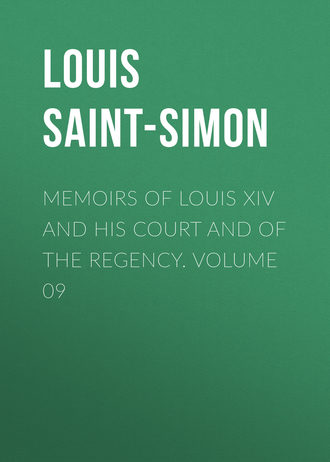 полная версия
полная версияMemoirs of Louis XIV and His Court and of the Regency. Volume 09
I could not feel that M. d'Orleans was acting wrong, in thus paying off his wrongs for the injuries she had heaped upon him, but I represented to him, that as I had always been an intimate friend of Madame des Ursins, putting aside her conduct towards him and making no comparison between my attachment for him and my friendship for her, I could not forget the marks of consideration she had always given me, particularly in her last triumphant journey (as I have already explained), and that it would be hard if I could not see her. We capitulated then, and M. le Duc and Madame la Duchesse d'Orleans permitted me to see her twice—once immediately; once when she left—giving my word that I would not see her three times, and that Madame de Saint-Simon should not see her at all; which latter clause we agreed to very unwillingly, but there was no remedy. As I wished at least to profit by my chance, I sent word to Madame des Ursins, explaining the fetters that bound me, and saying that as I wished to see her at all events at my ease since I should see her so little, I would let pass the first few days and her first journey to Court, before asking her for an audience.
My message was very well received; she had known for many years the terms on which I was with M. d'Orleans; she was not surprised with these fetters, and was grateful to me for what I had obtained. Some days after she had been to Versailles, I went to her at two o'clock in the day. She at once closed the door to all comers, and I was tete-a-tete with her until ten o'clock at night.
It may be imagined what a number of things were passed in review during this long discourse. Our eight hours of conversation appeared to me like eight moments. She related to me her catastrophe, without mixing up the King or the King of Spain, of whom she spoke well; but, without violently attacking the Queen, she predicted what since has occurred. We separated at supper time, with a thousand reciprocal protestations and regret that Madame de Saint-Simon could not see her. She promised to inform me of her departure early enough to allow us to pass another day together.
Her journey to Versailles did not pass off very pleasantly. She dined with the Duchesse de Luders, and then visited Madame de Maintenon; waited with her for the King, but when he came did not stop long, withdrawing to Madame Adam's, where she passed the night. The next day she dined with the Duchesse de Ventadour, and returned to Paris. She was allowed to give up the pension she received from the King, and in exchange to have her Hotel de Ville stock increased, so that it yielded forty thousand livres a-year. Her income, besides being doubled, was thus much more sure than would have been a pension from the King, which she doubted not M. d'Orleans, as soon as he became master, would take from her. She thought of retiring into Holland, but the States-General would have nothing to do with her, either at the Hague, or at Amsterdam. She had reckoned upon the Hague. She next thought of Utrecht, but was soon out of conceit with it, and turned her regards towards Italy.
The health of the King, meanwhile, visibly declining, Madame des Ursins feared lest she should entirely fall into the clutches of M. d'Orleans. She fully resolved, therefore, to make off, without knowing, however, where to fix herself; and asked permission of the King to come and take leave of him at Marly. She came there from Paris on Tuesday, the 6th of August, so as to arrive as he left dinner, that is, about ten o'clock. She was immediately admitted into the cabinet of the King, with whom she remained tete-a-tete full half an hour. She passed immediately to the apartments of Madame de Maintenon, with whom she remained an hour; and then got into her coach and returned to Paris. I only knew of this leave-taking by her arrival at Marly, where I had some trouble in meeting her. As chance would have it, I went in search of her coach to ask her people what had become of her, and was speaking to them when, to and behold! she herself arrived. She seemed very glad to see me, and made me mount with her into her coach, where for little less than an hour we discoursed very freely. She did not dissimulate from me her fears; the coldness the King and Madame de Maintenon had testified for her through all their politeness; the isolation she found herself in at the Court, even in Paris; and the uncertainty in which she was as to the choice of a retreat; all this in detail, and nevertheless without complaint, without regret, without weakness; always reassured and superior to events, as though some one else were in question. She touched lightly upon Spain, upon the ascendency the Queen was acquiring already over the King, giving me to understand that it could not be otherwise; running lightly and modestly over the Queen, and always praising the goodness of the King of Spain. Fear, on account of the passers-by, put an end to our conversation. She was very gracious to me; expressed regret that we must part; proceeded to tell me when she should start in time for us to have another day together; sent many compliments to Madame de Saint-Simon; and declared herself sensible of the mark of friendship I had given her, in spite of my engagement with M. d'Orleans. As soon as I had seen her off, I went to M. d'Orleans, to whom I related what I had just done; said I had not paid a visit, but had had simply a meeting; that it was true I could not hinder myself from seeking it, without prejudice to the final visit he had allowed me. Neither he nor Madame la Duchesse d'Orleans complained. They had fully triumphed over their enemy, and were on the point of seeing her leave France for ever, without hope in Spain.
Until now, Madame des Ursins amused by a residue of friends, increased by those of M. de Noirmoutiers with whom she lodged and who had money, had gently occupied herself with the arrangement of her affairs, changed as they were, and in withdrawing her effects from Spain. The fear lest she should find herself in the power of a Prince whom she had so cruelly offended, and who showed, since her arrival in France, that he felt it, hurried all her measures. Her terror augmented by the change in the King that she found at this last audience had taken place since her first. She no longer doubted that his end was very near; and all her attention was directed to the means by which she might anticipate it, and be well informed of his health; this she believed her sole security in France. Terrified anew by the accounts she received of it, she no longer gave herself time for anything, but precipitately set out on the 14th August, accompanied as far as Essonne by her two nephews. She had no time to inform me, so that I have never seen her since the day of our conversation at Marly in her coach. She did not breathe until she arrived at Lyons.
She had abandoned the project of retiring into Holland, where the States- General would not have her. She herself, too, was disgusted with the equality of a republic, which counterbalanced in her mind the pleasure of the liberty enjoyed there. But she could not resolve to return to Rome, the theatre of her former reign, and appear there proscribed and old, as in an asylum. She feared, too, a bad reception, remembering the quarrels that had taken place between the Courts of Rome and Spain. She had lost many friends and acquaintances; in fifteen years of absence all had passed away, and she felt the trouble she might be subjected to by the ministers of the Emperor, and by those of the two Crowns, with their partisans. Turin was not a Court worthy of her; the King of Sardinia had not always been pleased with her, and they knew too much for each other. At Venice she would have been out of her element.
Whilst agitated in this manner, without being able to make up her mind, she learned that the King was in extreme danger, a danger exaggerated by rumour. Fear seized her lest he should die whilst she was in his realm. She set off immediately, therefore, without knowing where to go; and solely to leave France went to Chambery, as the nearest place of safety, arriving there out of breath, so to say.
Every place being well examined, she preferred Genoa; its liberty pleased her; there was intercourse there with a rich and numerous nobility; the climate and the city were beautiful; the place was in some sort a centre and halting-point between Madrid, Paris, and Rome, with which places she was always in communication, and always hungered after all that passed there. Genoa determined on, she went there. She was well received, hoped to fix her tabernacle there, and indeed stayed some years. But at last ennui seized her; perhaps vexation at not being made enough of. She could not exist without meddling, and what is there for a superannuated woman to meddle with at Genoa? She turned her thoughts, therefore, towards Rome. Then, on sounding, found her course clear, quitted Genoa, and returned to her nest.
She was not long there before she attached herself to the King and Queen of England (the Pretender and his wife), and soon governed them openly. What a poor resource! But it was courtly and had a flavour of occupation for a woman who could not exist without movement. She finished her life there remarkably healthy in mind and body, and in a prodigious opulence, which was not without its use in that deplorable Court. For the rest, Madame des Ursins was in mediocre estimation at Rome, was deserted by the Spanish, little visited by the French, but always faithfully paid by France and Spain, and unmolested by the Regent. She was always occupied with the world, and with what she had been, but was no longer; yet without meanness, nay, with courage and dignity.
The loss she experienced in January, 1720, of the Cardinal de la Tremoille, although there was no real friendship between them, did not fail, to create a void in her. She survived him three years, preserved all her health, her strength, her mind until death, and was carried off, more than eighty years of age, at Rome, on the 5th of December, 1722, after a very short illness.
She had the pleasure of seeing Madame de Maintenon forgotten and annihilated in Saint-Cyr, of surviving her, of seeing at Rome her two enemies, Giudice and Alberoni, as profoundly disgraced as she,—one falling from the same height, and of relishing the forgetfulness, not to say contempt, into which they both sank. Her death, which, a few years before, would have resounded throughout all Europe, made not the least sensation. The little English Court regretted her, and some private friends also, of whom I was one. I did not hide this, although,—on account of M. le Duc d'Orleans, I had kept up no intercourse with her; for the rest, nobody seemed to perceive she had disappeared. She was, nevertheless, so extraordinary a person, during all the course of her long life, everywhere, and had so grandly figured, although in various ways; had such rare intellect, courage, industry, and resources; reigned so publicly and so absolutely in Spain; and had a character so sustained and so unique, that her life deserves to be written, and would take a place among the most curious fragments of the history of the times in which she lived.
CHAPTER LVI
But I must return somewhat now, in order to make way for a crowd of events which have been pressing forward all this time, but which I have passed by, in going straightforward at once to the end of Madame des Ursins' history.
On Monday, the 30th April, 1714., the King took medicine, and worked after dinner with Pontchartrain. This was at Marly. About six o'clock, he went to M. le Duc de Berry, who had had fever all night. M. le Duc de Berry had risen without saying anything, had been with the King at the medicine-hour, and intended to go stag-hunting; but on leaving the King's chamber shivering seized him, and forced him to go back again. He was bled while the King was in his chamber, and the blood was found very bad; when the King went to bed the doctors told him the illness was of a nature to make them hope that it might be a case of contagion. M. le Duc de Berry had vomited a good deal—a black vomit. Fagon said, confidently, that it was from the blood; the other doctors fastened upon some chocolate he had taken on the Sunday. From this day forward I knew what was the matter. Boulduc, apothecary of the King, and extremely attached to Madame de Saint-Simon and to me, whispered in my ear that M. le Duc de Berry would not recover, and that, with some little difference, his malady was the same as that of which the Dauphin and Dauphine died. He repeated this the next day, and never once varied afterwards; saying to me on the third day, that none of the doctors who attended the Prince were of a different opinion, or hid from him what they thought.
On Tuesday, the 1st of May, the Prince was bled in the foot at seven o'clock in the morning, after a very bad night; took emetics twice, which had a good effect; then some manna; but still there were two accesses. The King went to the sick-room afterwards, held a finance council, would not go shooting, as he had arranged, but walked in his gardens. The doctors, contrary to their custom, never reassured him. The night was cruel. On Wednesday; the 2nd of May, the King went, after mass, to M. le Duc de Berry, who had been again bled in the foot. The King held the Council of State, as usual, dined in Madame de Maintenon's rooms, and afterwards reviewed his Guards. Coettenfao, chevalier d'honneur of Madame la Duchesse de Berry, came during the morning to beg the King, in her name, that Chirac, a famous doctor of M. d'Orleans, should be allowed to see M. le Duc de Berry. The King refused, on the ground that all the other doctors were in accord, and that Chirac, who might differ with them, would embarrass them. After dinner Mesdames de Pompadour and La Vieuville arrived, on the part of Madame la Duchesse de Berry, to beg the King that she might be allowed to come and see her husband, saying that she would come on foot rather than stay away. It would have been better, surely, for her to come in a coach, if she so much wished, and, before alighting, to send to the King for permission so to do. But the fact is, she had no more desire to come than M. de Berry had to see her. He never once mentioned her name, or spoke of her, even indirectly. The King replied to those ladies by saying that he would not close the door against Madame la Duchesse de Berry, but, considering the state she was in, he thought it would be very imprudent on her part to come. He afterwards told M. le Duc and Madame la Duchesse d'Orleans to go to Versailles and hinder her from coming. Upon returning from the review the King went again to see M. le Duc de Berry. He had been once more bled in the arm, had vomited all day much blood too—and had taken some Robel water three times, in order to stop his sickness. This vomiting put off the communion. Pere de la Rue had been by his side ever since Tuesday morning, and found him very patient and resigned.
On Thursday, the 3rd, after a night worse than ever, the doctors said they did not doubt that a vein had been broken in the stomach. It was reported that this accident had happened by an effort M. de Berry made when out hunting on the previous Thursday, the day the Elector of Bavaria arrived. His horse slipped; in drawing the animal up, his body struck against the pommel of the saddle, so it was said, and ever since he had spit blood every day. The vomiting ceased at nine o'clock in the morning, but the patient was no better. The King, who was going stag- hunting, put it off. At six o'clock at night M. de Berry was so choked that he could no longer remain in bed; about eight o'clock he found himself so relieved that he said to Madame, he hoped he should not die; but soon after, the malady increased so much that Pere de la Rue said it was no longer time to think of anything but God, and of receiving the sacrament. The poor Prince himself seemed to desire it.
A little after ten o'clock at night the King went to the chapel, where a consecrated Host had been kept prepared ever since the commencement of the illness. M. le Duc de Berry received it, with extreme unction, in presence of the King, with much devotion and respect. The King remained nearly an hour in the chamber, supped alone in his own, did not receive the Princesses afterwards, but went to bed. M. le Duc d'Orleans, at ten o'clock in the morning, went again to Versailles, as Madame la Duchesse de Berry wished still to come to Marly. M. le Duc de Berry related to Pere de la Rue, who at least said so, the accident just spoken of; but, it was added, "his head was then beginning to wander." After losing the power of speech, he took the crucifix Pere de la Rue held, kissed it, and placed it upon his heart. He expired on Friday, the 4th of May, 1714, at four o'clock in the morning, in his twenty-eighth year, having been born at Versailles, the last day of August, 1686.
M. le Duc de Berry was of ordinary height, rather fat, of a beautiful blonde complexion, with a fresh, handsome face, indicating excellent health. He was made for society, and for pleasure, which he loved; the best, gentlest, most compassionate and accessible of men, without pride, and without vanity, but not without dignity or self-appreciation. He was of medium intellect, without ambition or desire, but had very good sense, and was capable of listening, of understanding, and of always taking the right side in preference to the wrong, however speciously put. He loved truth, justice, and reason; all that was contrary to religion pained him to excess, although he was not of marked piety. He was not without firmness, and hated constraint. This caused it to be feared that he was not supple enough for a younger son, and, indeed, in his early youth he could not understand that there was any difference between him and his eldest brother, and his boyish quarrels often caused alarm.
He was the most gay, the most frank, and consequently the most loved of the three brothers; in his youth nothing was spoken of but his smart replies to Madame and M. de la Rochefoucauld. He laughed at preceptors and at masters—often at punishment. He scarcely knew anything except how to read and write; and learned nothing after being freed from the necessity of learning. This ignorance so intimidated him, that he could scarcely open his mouth before strangers, or perform the most ordinary duties of his rank; he had persuaded himself that he was an ass and a fool; fit for nothing. He was so afraid of the King that he dared not approach him, and was so confused if the King looked hard at him, or spoke of other things than hunting, or gaming, that he scarcely understood a word, or could collect his thoughts. As may be imagined, such fear does not go hand in hand with deep affection.
He commenced life with Madame la Duchesse de Berry as do almost all those who marry very young and green. He became extremely amorous of her; this, joined to his gentleness and natural complaisance, had the usual effect, which was to thoroughly spoil her. He was not long in perceiving it; but love was too strong for him. He found a woman proud, haughty, passionate, incapable of forgiveness, who despised him, and who allowed him to see it, because he had infinitely less head than she; and because, moreover, she was supremely false and strongly determined. She piqued herself upon both these qualities, and on her contempt for religion, ridiculing M. le Duc de Berry for being devout; and all these things became insupportable to him. Her gallantries were so prompt, so rapid, so unmeasured, that he could not help seeing them. Her endless private interviews with M. le Duc d'Orleans, in which everything languished if he was present, made him furious. Violent scenes frequently took place between them; the last, which occurred at Rambouillet, went so far that Madame la Duchesse de Berry received a kick * * * * , and a menace that she should be shut up in a convent for the rest of her life; and when M. le Duc de Berry fell ill, he was thumbing his hat, like a child, before the King, relating all his grievances, and asking to be delivered from Madame la Duchesse de Berry. Hitherto I have only alluded to Madame la Duchesse de Berry, but, as will be seen, she became so singular a person when her father was Regent, that I will here make her known more completely than I have yet done.
She was tall, handsome, well made, with, however, but little grace, and had something in her, eyes which made you fear what she was. Like her father and mother, she spoke well and with facility. Timid in trifles, yet in other things terrifyingly bold,—foolishly haughty sometimes, and sometimes mean to the lowest degree,—it may be said that she was a model of all the vices, avarice excepted; and was all the more dangerous because she had art and talent. I am not accustomed to over-colour the picture I am obliged to present to render things understood, and it will easily be perceived how strictly I am reserved upon the ladies, and upon all gallantries, not intimately associated with what may be called important matters. I should be so here, more than in any other case, from self-love, if not from respect for the sex and dignity of the person. The considerable part I played in bringing about Madame la Duchesse de Berry's marriage, and the place that Madame de Saint-Simon, in spite of herself and of me, occupied in connection with her, would be for me reasons more than enough for silence, if I did not feel that silence would throw obscurity over all the sequel of this history. It is then to the truth that I sacrifice my self-love, and with the same truthfulness I will say that if I had known or merely suspected, that the Princess was so bad as she showed herself directly after her marriage, and always more and more since, she would never have become Duchesse de Berry.
I have already told how she annoyed M. le Duc de Berry by ridiculing his devotion. In other ways she put his patience to severe trials, and more than once was in danger of public exposure. She partook of few meals in private, at which she did not get so drunk as to lose consciousness, and to bring up all she had taken on every side. The presence of M. le Duc de Berry, of M. le Duc and Madame la Duchesse d'Orleans, of ladies with whom she was not on familiar terms, in no way restrained her. She complained even of M. le Duc de Berry for not doing as she did. She often treated her father with a haughtiness which was terrifying on all accounts.
In her gallantries she was as unrestrained as in other things. After having had several favourites, she fixed herself upon La Haye, who from King's page had become private ecuyer of M. le Duc de Berry. The oglings in the Salon of Marly were perceived by everybody; nothing restrained them. At last, it must be said, for this fact encloses all the rest, she wished La Haye to run away with her from Versailles to the Low Countries, whilst M. le Duc de Berry and the King were both living. La Haye almost died with fright at this proposition, which she herself made to him. His refusal made her furious. From the most pressing entreaties she came to all the invectives that rage could suggest, and that torrents of tears allowed her to pronounce. La Haye had to suffer her attacks—now tender, now furious; he was in the most mortal embarrassment. It was a long time before she could be cured of her mad idea, and in the meanwhile she subjected the poor fellow to the most frightful persecution. Her passion for La Haye continued until the death of M. le Duc de Berry, and some time after.
M. le Duc de Berry was buried at Saint-Denis on Wednesday, the 16th of May; M. le Duc d'Orleans was to have headed the procession, but the same odious reports against him that had circulated at the death of the Dauphin had again appeared, and he begged to be let off. M. le Duc filled his place. Madame la Duchesse de Berry, who was in the family way, kept her bed; and in order that she should not be seen there when people came to pay her the usual visits of condolence, the room was kept quite dark. Many ridiculous scenes and much indecent laughter, that could not be restrained, thus arose. Persons accustomed to the room could see their way, but those unaccustomed stumbled at every step, and had need of guidance. For want of this, Pere du Trevoux, and Pere Tellier after him, both addressed their compliments to the wall; others to the foot of the bed. This became a secret amusement, but happily did not last long.
As may be imagined, the death of M. le Duc de Berry was a deliverance for Madame la Duchesse de Berry. She was, as I have said, in the family way; she hoped for a boy, and counted upon enjoying as a widow more liberty than she had been able to take as a wife. She had a miscarriage, however, on Saturday, the 16th of June, and was delivered of a daughter which lived only twelve hours. The little corpse was buried at Saint- Denis, Madame de Saint-Simon at the head of the procession. Madame la Duchesse de Berry, shortly before this event, received two hundred thousand livres income of pension; but the establishment she would have had if the child had been a boy was not allowed her.











